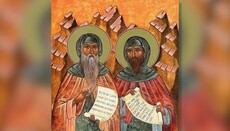The forgotten commandment: Why every Christian is a missionary

Christ called every person to preach, not only priests. Let us explore why “preaching by one’s life” is more important than words, and why evangelization is needed by the preacher himself.
We have grown accustomed to thinking of preaching as the task of a priest. But is he really the only one entitled to bring the Christian message to the world? We have comfortably delegated this mission, treating it as a professional duty rather than a personal calling. We have forgotten that Christ called each of us to preach.
“Preach because you are a Christian”
The Gospel parable of the wise steward implicitly urges us: “Preach because you are a Christian.” Unfortunately, today preaching is perceived as the exclusive prerogative of clergy. But this was not always the case.
In apostolic times, lay people were free to preach, provided they had received proper instruction from the disciples of Christ.
In the Acts of the Apostles we read about Apollos, a layman whom Aquila and Priscilla met in Ephesus. Scripture tells us that he possessed eloquence and was successful in preaching. The apostles instructed him in the faith and made him their helper.
In Church history, the practice of lay teachers-preachers (didaskaloi) continued until the year 231, when the Alexandrian Church, in condemning Origen, strictly forbade lay preaching within church assemblies. Later this prohibition was confirmed by the Council in Trullo.
It is important to understand that this prohibition was largely situational, directed against a specific heresy (Origen’s gnostic ideas), not against the missionary calling of lay people as such.
It aimed to protect the flock from false teachings at a time when doctrine had not yet been fully formed. Over time, however, this temporary measure unfortunately began to be perceived as a permanent rule, leading to the “silencing” of the Church’s people.
“The faithful and wise steward”
What does Christ tell us today? “Who then is the faithful and wise steward, whom his master has set over his household to give them their portion of food at the proper time? Blessed is that servant whom his master will find doing so when he comes” (Luke 12:42–43).
The Holy Fathers, interpreting this parable, write that the Lord means every Christian when He speaks of the diligent steward. The “bread” we must distribute is the knowledge of Christ, the fullness of our faith.
The apostles were not priests in the later canonical sense. They were laymen whom the Lord set apart for the work of preaching. This does not diminish the special dignity of the clergy, but it does show that the call to evangelize is addressed to all.
Christ’s direct command, the Great Commission, was given not only to the eleven apostles but through them to the entire Church: “Go therefore and teach all nations...” (Matthew 28:19). And the Apostle Peter writes to all Christians: “Always be ready to give an answer to everyone who asks you a reason for the hope that is in you, with meekness and reverence” (1 Peter 3:15).
This “answer” is the personal preaching of each one of us.
Two forms of preaching: “by word” and “by life”
How should one preach? Evangelization can be expressed in two forms: preaching by word and preaching by life.
1. Preaching by life: “Acquire a peaceful spirit...”
This is the strongest and most accessible form of witness. St. Seraphim of Sarov formulated it perfectly: “Acquire a peaceful spirit, and thousands around you will be saved.”
When a person lives the Gospel, he becomes the Gospel. His inner peace, his love, his refusal to judge others, his meekness speak about Christ more powerfully than eloquent speeches. People are drawn not to words but to light.
This is why St. Paul teaches that a Christian wife may “without a word” save her non-believing husband (1 Corinthians 7:16) when he sees her pure, God-fearing life.
This kind of preaching is available to everyone. If you lack eloquence or writing talent, preach by your life. That is enough.
2. Preaching by word: “A gentle answer”
But if someone is indeed called to preach verbally, then he must speak. Today, in some parishes, the practice of theologically educated lay preaching is beginning to reappear.
A talent for preaching does not necessarily mean possessing the gift of Chrysostom. It may be a quiet word of comfort to a colleague, or a calm explanation of your faith to friends who ask difficult questions.
But we must remember: unlike many Protestants, an Orthodox Christian should share his faith with love and without pressure. Aggressive preaching often repels because it feels more like an attempt to win an argument than to show love. Orthodox preaching is a dialogue, not a monologue. It respects the God-given freedom of another person.
Even if someone refuses to listen, we must continue preaching for the sake of others. The ancient Romans said: “The drop hollows the stone not by force, but by constant falling.”
Why preaching is needed by the preacher himself
Many people remain silent not because they lack talent, but because they are afraid: afraid of ridicule, afraid of appearing fanatical, or – worse – afraid of being hypocritical: “How can I speak of God if I am sinful myself?”
But preaching is needed not only by the listener. It is vital for the preacher.
There is a story about a preacher who came to a city to bring its inhabitants to faith. At first people listened to him, but gradually they dispersed until no one remained. Yet he continued to preach.
A traveler passing by asked why he kept preaching to an empty square.
“At first I hoped to change these people,” the missionary replied. “Now I continue only so that they do not change me.”
This parable reveals the inner purpose of preaching.
True preaching is not only about teaching others. It is also needed so that the preacher, constantly comparing his life with the ideal he proclaims, does not drown in the mire of a world dying in sin.
The steward of Christ’s parable (Luke 12) was rewarded not for keeping the bread (faith) locked in a granary, but for distributing it “at the proper time.” Our faith is not a private treasure to be hidden. It is Bread meant to be given.
We have been entrusted with the fullness of faith in the Triune God. Therefore our eternal destiny depends directly on how diligently we labor in the work of Christian witness.











